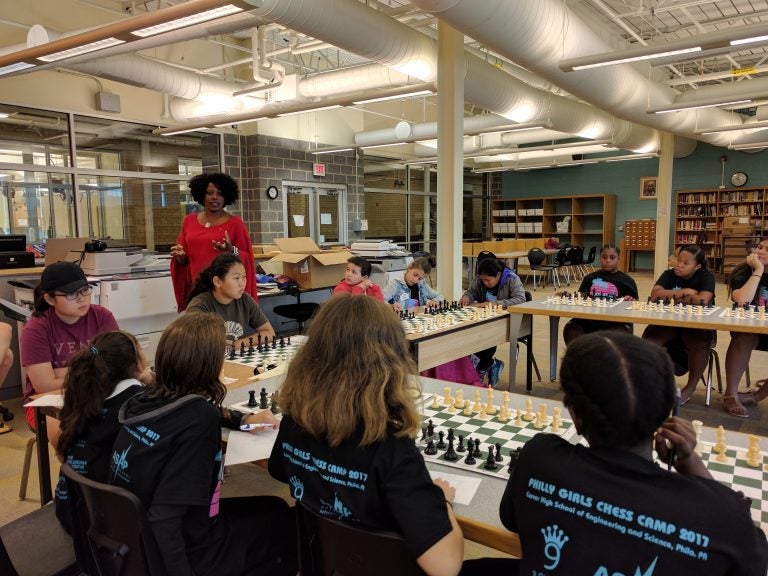Chess, and the power of girls to identify themselves as leaders
In its third year, the weeklong Philly Girls Play Chess camp is the creation of ASAP (After School Activities Partnership).

Adia Onyango, a New York-based chess instructor and professional player, visited the 2017 Girls Chess Camp. (ASAP/After School Activities Partnerships)
This story originally appeared on PlanPhilly.
—
Bobby Fischer once famously said, “Chess is life.” In the city of Philadelphia, these words take on more truth than their simple appearance. It is because of this truth that over 40 girls huddle around chess boards in the hot summer classrooms of Carver High School of Engineering and Science. Perspiration is from concentration as much as the heat as their long-, short-, curly-, straight-, frizzy-, wavy-haired heads incline together and chess pieces thunk across boards, all in time to quiet, thoughtful conversation.
In its third year, the weeklong Philly Girls Play Chess camp is the creation of ASAP (After School Activities Partnership). This summer, it will run from July 23 to 27 for female K-12 students. The program includes instruction by some of the strongest female chess players in the city, and appearances from known female competitors like Jen Shahade, the two-time American Women’s Chess Champion.
Why brave the late July heat and offer chess instruction solely to the young women of Philly? Why is the camp, this space, so imperative in this city?
In chess, the “ultimate sport of the mind,” the king is the most important piece, but the queen is the most powerful. She is the piece with the greatest ability to move across the board and dominate the game — if given the space and opportunity. The queen is an apt microcosmic metaphor for the macrocosm of our city.
Last year, the Philadelphia Commission for Women published a report on “The State of Women and Girls of Philadelphia.” The results shouldn’t be surprising. There is a wage gap of 76 to 56 (if you’re Latina) cents on the dollar between women and men. The disparity matters in this city because not only are 60 percent of Philly’s children growing up in female-headed households, but Philadelphia is the only major city where women make up more of the external workforce than men. What women earn matters to the economic prosperity not only of the city as a whole, but its future generations’ prosperity as well.
Women are working in this city, and not just in salaried and hourly jobs — also at extremely high levels in civic engagement. Further, unlike many cities, Philly women outnumber men in often-gendered professions like law, business, and finance. However, there is still a stark underrepresentation of women in leadership roles and a dearth of women in the science, technology, math, and engineering fields. Without a doubt, Philly is a city that knows its women are a powerful asset: They work hard, engage in civics, support those around them, and move readily into historically contested territory. Yet we still struggle to find equity, and this is hurting not just women, but the city itself.
What does this have to do with a girls chess camp? Women and girls, much like all human beings, are struggling with who they are and how to be. This struggle is compounded by the definition of self that is imposed on them by those around them. At the intersection of this struggle are poverty, gender discrimination, institutional racism, structural oppression, patriarchy, and occupational and residential segregation. Through their community study of chess, these young women are attempting to answer, unfettered by stereotypes, the questions; “Who are we? What can we do? Who can we be?” The Philly Girls Play Chess Camp is not a competition or even a preparation for one, rather it’s a proving ground for self-identification. Although, perhaps that is preparation for a competition.
The benefits of chess extend beyond an opportunity to identify self. There are numerous studies concluding that even minimal exposure to chess will raise standardized test scores in math and reading. Chess can increase cognitive skills; both critical thinking and analytical. These skills are essential for literacy in today’s world. Every child needs these skills.
Philly girls require these skills. Philadelphia girls are going to become Philadelphia women; women who work hard, engage in civics, support those around them, move into contested territory, and hopefully one day become leaders. Young women require the benefits of chess because their identity is not just challenged by the intersectionality of structural forces, it is often defined by it. Beginning players will sometimes keep the queen solely in a supporting role, for fear of losing her. But when she leads, and is supported by pieces like the knight, the bishop, or even the king, the queen as leader unleashes her true power across the squares of the board.
But are boys better at playing chess than girls? If you were sitting in the cafeteria at breakfast time before the start of camp, that question wouldn’t be asked. Pigtailed first graders drinking apple juice and moving sticky chess pieces in incomprehensible patterns look up to high school-coiffed girls who chat excitedly about new openings and tactics as they play chess on their rose-gold iPhones.
It’s not a question at camp, but Scientific American found that there is a pervasive awareness that boys are better chess players than girls. Repeated exposure to the stereotype, especially in the face of losing games, can cause our powerful girls to give up on chess. However, research shows that when girls aren’t outnumbered, they play just as well as boys.
So then, how can we combat this stereotype? How can the city of Philadelphia combat the encroaching poverty, gender discrimination, institutional racism, structural oppression, patriarchy, occupational and residential segregation that is trying to define not just Philly women and girls, but also the city itself? We combat it with 40 girls huddled around chess boards in the hot summer classrooms of Carver High School of Engineering and Science; young women perspiring as much from the heat as concentration, with long hair, short hair, curly hair, pigtails, and high school coifs, with heads inclined together and chess pieces thunking across boards.
Bobby Fischer once famously said, “Chess is life.” Grandmaster Susan Polgar, Women’s World Chess Champion (1996-99) and the first-ever female player to compete in the Men’s World Chess Championship, said, “Chess is a miniature version of life. To be successful, you need to be disciplined, assess resources, consider responsible choices, and adjust when circumstances change.” And so, for all these reasons, and for sheer enjoyment of the game, Philly Girls Play Chess in the late July heat.
WHYY is your source for fact-based, in-depth journalism and information. As a nonprofit organization, we rely on financial support from readers like you. Please give today.






